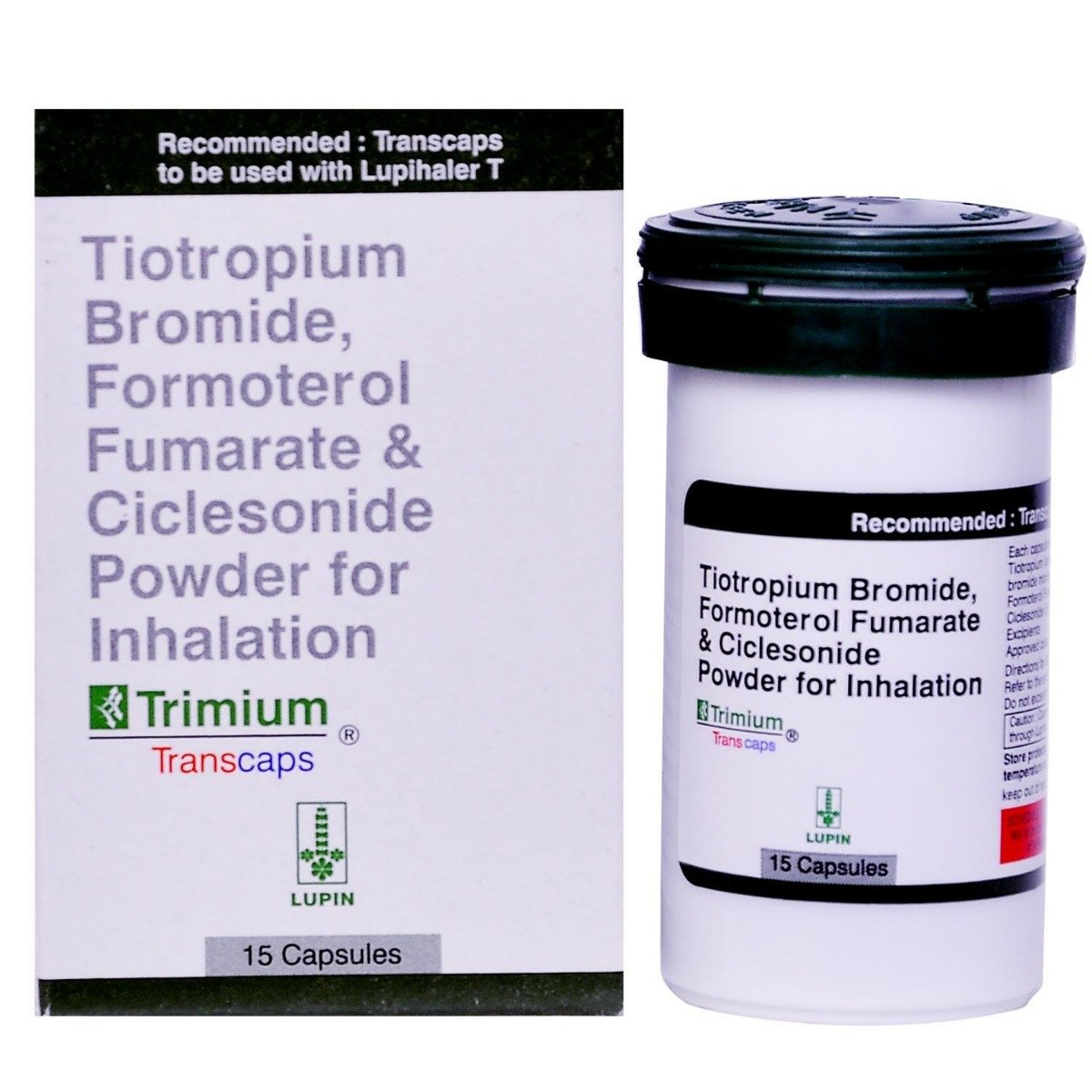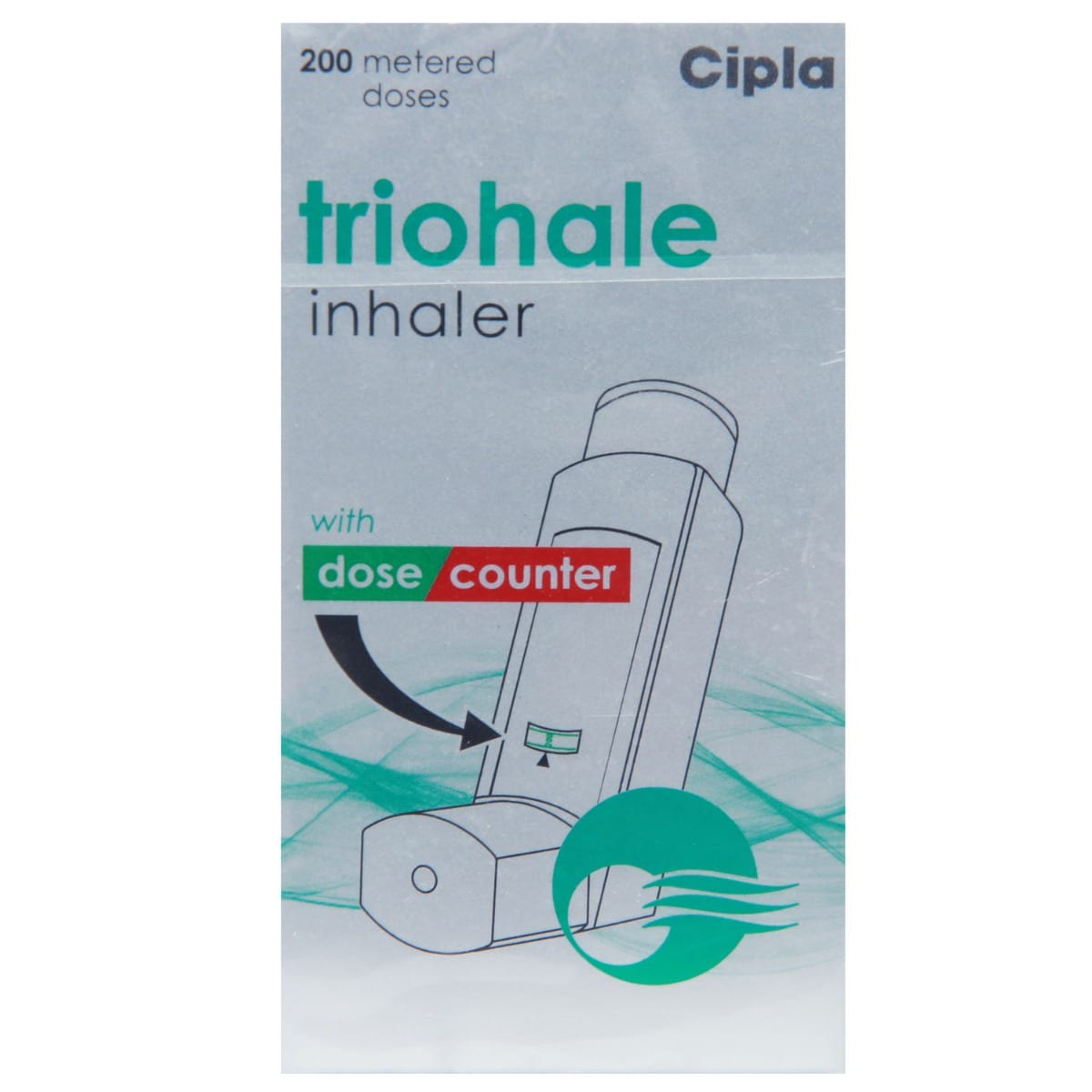Tiotropium+formoterol+ciclesonide
About Tiotropium+formoterol+ciclesonide
Ciclesonide+formoterol+tiotropium belongs to the class 'respiratory stimulants', which are primarily used to treat asthma symptoms and chronic obstructive pulmonary diseases (COPD). Asthma is a chronic (long-term) respiratory condition in which airways narrow, swell, and produce extra mucus, leading to difficulty breathing. COPD is a group of lung diseases with emphysema (shortness of breath) and chronic bronchitis (inflammation of the lining of bronchial tubes).
Ciclesonide+formoterol+tiotropium is a combination of three drugs: Tiotropium (anti-cholinergic), Formoterol (LABA - long-acting beta-agonists or bronchodilator), and ciclesonide (corticosteroid). Tiotropium is an anti-cholinergic, and formoterol is a bronchodilator. Both medicines work by relaxing the airway muscles and widen the airways. These medicines together making it easier for asthma and COPD patients to breathe. Whereas ciclesonide is a corticosteroid, it acts by stopping the release of certain natural substances in the body that are responsible for inflammation of the airways.
Your doctor will recommend how often you take Ciclesonide+formoterol+tiotropium based on your medical condition. Some people may experience side effects like a fungal infection in the mouth, vomiting, nausea, headache, sore throat, hoarse voice, upper respiratory tract infection, flu, cough, Musculoskeletal (bone, muscle, or joint) pain, increased heart rate, and trembling. Most of these side effects of Ciclesonide+formoterol+tiotropium do not require medical attention and gradually resolve over time. However, if the side effects persist or worsen, stop the medicine and consult your doctor.
If you are allergic to lactose (a form of sugar) or have lactose intolerance, Ciclesonide+formoterol+tiotropium, or any other ingredients, please tell your doctor. If you are pregnant or breastfeeding, it is advised to inform your doctor before using Ciclesonide+formoterol+tiotropium. Ciclesonide+formoterol+tiotropium is not recommended for children below 6 years of age. If your breathing worsens or you often wake up at night with asthma, experience chest tightness in the morning, or last longer than usual, please consult a doctor immediately. These might be signs indicating that your asthma is not controlled properly and requires an alternate or additional treatment. Regular monitoring of potassium levels is recommended while taking Ciclesonide+formoterol+tiotropium as it may cause low potassium levels in the blood. If you have high blood pressure, diabetes, hypokalaemia (low potassium levels in the blood), glaucoma, cataracts, osteoporosis (weak bones), fits, immune system problems, chickenpox, measles, thyroid, lung, heart, liver, or adrenal gland problems, tuberculosis inform your doctor before taking Ciclesonide+formoterol+tiotropium. Ciclesonide+formoterol+tiotropium should be used with caution in patients with narrow-angle glaucoma, prostatic hyperplasia, or bladder neck obstruction.
Uses of Tiotropium+formoterol+ciclesonide
Medicinal Benefits
Ciclesonide+formoterol+tiotropium is a combination of three drugs: Tiotropium (anti-cholinergic), Formoterol (LABA - long-acting beta-agonists or bronchodilator), and ciclesonide (corticosteroid). Tiotropium is an anti-cholinergic, and formoterol is a bronchodilator. Both medicines work by relaxing the airway muscles and widen the airways. These medicines together making it easier for asthma and COPD patients to breathe. Whereas ciclesonide is a corticosteroid, it acts by stopping the release of certain natural substances in the body that are responsible for inflammation of the airways.
Directions for Use
Storage
Side Effects of Tiotropium+formoterol+ciclesonide
- Fungal infection in the mouth
- Vomiting
- Nausea
- Headache
- Sore throat, hoarse voice
- Upper respiratory tract infection
- Flu, cough
- Musculoskeletal pain (bone, muscle or joint)
- Increased heart rate
- Increased intraocular pressure (pressure inside the eye is higher than normal)
- Shaking or trembling
Drug Warnings
If you are allergic to lactose (a form of sugar) or have lactose intolerance, Ciclesonide+formoterol+tiotropium, or any other ingredients, please tell your doctor. If you are pregnant or breastfeeding, it is advised to inform your doctor before using Ciclesonide+formoterol+tiotropium. Ciclesonide+formoterol+tiotropium is not recommended for children below 6 years of age. If your breathing worsens or you often wake up at night with asthma, experience chest tightness in the morning, or last longer than usual, please consult a doctor immediately. These might be signs indicating that your asthma is not controlled properly and requires an alternate or additional treatment. Regular monitoring of potassium levels is recommended while taking Ciclesonide+formoterol+tiotropium as it may cause low potassium levels in the blood. If you have high blood pressure, diabetes, hypokalaemia (low potassium levels in the blood), glaucoma, cataracts, osteoporosis (weak bones), epilepsy, immune system problems, chickenpox, measles, thyroid, lung, heart, liver, or adrenal gland problems, tuberculosis inform your doctor before taking Ciclesonide+formoterol+tiotropium. Ciclesonide+formoterol+tiotropium should be used with caution in patients with narrow-angle glaucoma, prostatic hyperplasia, or bladder neck obstruction.
Drug Interactions
Drug-Drug Interaction: Ciclesonide+formoterol+tiotropium may interact with bronchodilators (albuterol), steroids (prednisone), diuretics (furosemide, amiloride), pain killers (aspirin), antibiotics (azithromycin), antidepressants (duloxetine), heart-related medicines (metoprolol), antifungals (itraconazole, voriconazole, posaconazole, ketoconazole), HIV/AIDS drugs (ritonavir), mono-amino oxidase inhibitors (phenelzine),
Drug-Food Interaction: Ciclesonide+formoterol+tiotropium may interact with grapefruit and grapefruit juice. Therefore, avoid grapefruit or its juice with Ciclesonide+formoterol+tiotropium as it may lead to severe adverse effects.
Drug-Disease Interaction: If you have high blood pressure, diabetes, hypokalaemia (low potassium levels in the blood), glaucoma, cataracts, osteoporosis (weak bones), epilepsy, immune system problems, chickenpox, measles, thyroid, lung, heart, liver, or adrenal gland problems, prostatic hyperplasia or bladder neck obstruction, tuberculosis, inform your doctor before taking Ciclesonide+formoterol+tiotropium.
Drug-Drug Interactions Checker List:
Safety Advice

Alcohol
cautionThe interaction of Ciclesonide+formoterol+tiotropium with alcohol is unknown. Please consult a doctor before consuming alcohol with Ciclesonide+formoterol+tiotropium.

Pregnancy
cautionThe safety of Ciclesonide+formoterol+tiotropium in pregnant women is unknown. Therefore, it is given to pregnant women only if the doctor thinks the benefits outweigh the risks.

Breast Feeding
cautionIt is unknown whether Ciclesonide+formoterol+tiotropium is excreted in human milk. It is given to breastfeeding mothers only if the doctor thinks benefits are greater than risks.

Driving
safe if prescribedCiclesonide+formoterol+tiotropium usually does not affect your ability to drive or operate machinery.

Liver
cautionUse Ciclesonide+formoterol+tiotropium with caution, especially if you have a history of Liver diseases/conditions. The dose may be adjusted by your doctor as required.

Kidney
safe if prescribedIf you have any concerns regarding the use of Ciclesonide+formoterol+tiotropium in patients with Kidney problems, please consult your doctor.

Children
cautionSafe for children below 12 years(Content) Ciclesonide+formoterol+tiotropium is not recommended for children below 6 years as the safety and effectiveness were not established. However, please consult a doctor before giving Ciclesonide+formoterol+tiotropium to children.
Habit Forming
Diet & Lifestyle Advise
- Eat a healthy diet and exercise regularly to strengthen your breathing muscles and boost your immune system.
- Avoid foods such as cabbage, beans, garlic, onions, shrimp, pickled food, dried fruits, fried foods, carbonated drinks, wine, bottled lemon, and lime juice as it may worsen asthma symptoms.
- Do meditation, deep breathing, regular exercise, and try progressive muscle relaxation techniques to get relief from stress and reduce the risk of an asthma attack.
- Quit smoking as it may reduce the effectiveness of the Ciclesonide+formoterol+tiotropium and irritate the lungs worsening breathing problems.
- Learning breathing exercises will help you move more air in and out of your lungs.
- Limit alcohol intake.
Special Advise
- You are advised to rinse your mouth with water after each dose of Ciclesonide+formoterol+tiotropium because it not only removes the taste of medicine inhaled but also helps to avoid fungal infections (oral thrush) in the mouth and throat. After rinsing your mouth thoroughly, you may drink water, milk, or any liquids.
- Your doctor may advise regular monitoring of potassium, as the use of Ciclesonide+formoterol+tiotropium may affect the body's potassium levels.
Patients Concern
Disease/Condition Glossary
Asthma: It is a chronic (long-term) respiratory condition in which airways narrow, swell, and produce extra mucus leading to difficulty in breathing. The symptoms of asthma include wheezing (whistling sound while breathing), shortness of breath, chest tightness, and cough, especially at night. The symptoms of mild persistent asthma may occur more than 2 times a week and up to 4 nights in a month, whereas, in the case of severe persistent asthma, the symptoms occur several times every day and most nights. The treatment for asthma includes medication, breathing exercises, and self-care.
Chronic obstructive pulmonary disease (COPD): It is a group of lung diseases with emphysema (shortness of breath) and chronic bronchitis (inflammation of the lining of bronchial tubes). The major cause of COPD is smoking tobacco. Also, long-term exposure to fumes and chemicals may lead to COPD. The symptoms include chronic cough, shortness of breath, or wheezing (whistle sound while breathing).
FAQs
Yes, Ciclesonide+formoterol+tiotropium may cause fungal infection in the mouth (oral thrush) is a common side effect. It is not necessary for everyone taking Ciclesonide+formoterol+tiotropium to experience this side effect. However, to avoid such side effects, brush your teeth or rinse your mouth with water after using Ciclesonide+formoterol+tiotropium every time.
You are not recommended to stop taking Ciclesonide+formoterol+tiotropium without consulting your doctor as it may worsen the condition or cause recurring symptoms. Therefore, take Ciclesonide+formoterol+tiotropium for as long as your doctor has prescribed it.
People with heart problems (including high blood pressure, chest pain, fast heartbeat, fits (seizures), thyroid problems, diabetes, immune system problem, weak bones or osteoporosis, eye problems (glaucoma, cataracts), and liver problems should consult a doctor before using Ciclesonide+formoterol+tiotropium.
Yes, Ciclesonide+formoterol+tiotropium causes dry mouth/ dry throat as a side effect. Frequent mouth rinses, good oral hygiene, increased water intake, and sugarless candy may help to relieve dry mouth/dry throat.
Ciclesonide+formoterol+tiotropium should be used with caution in osteoporosis (low bone density resulting in weak and brittle bones) patients as it may worsen the condition. Therefore, inform your doctor if you have osteoporosis before taking Ciclesonide+formoterol+tiotropium so that the dose may be adjusted or an alternate medicine may be prescribed.










